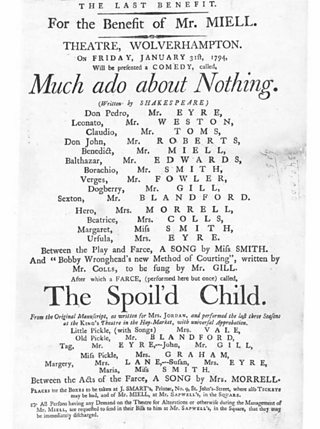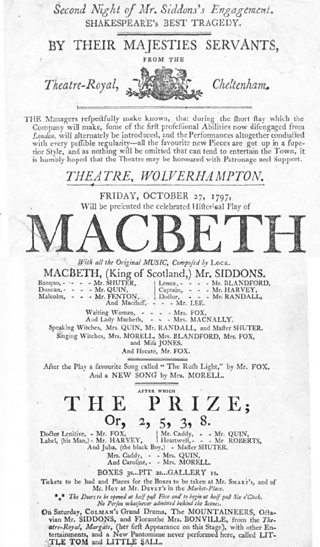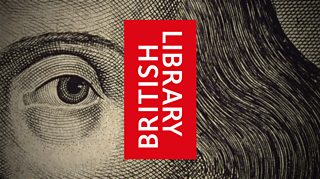Much Ado About Nothing is Manager’s choice at Wolverhampton Theatre, 1794
At the end of a season of performances, the actor/manager of a theatre group would choose the play and take the profits once salaries and running costs had been paid.
And so we see here in January 1794, at Wolverhampton Theatre, the performance of Shakespeare’s Much Ado Abut Nothing is 'for the benefit' of manager Mr Miell.
-
![]()
Much ado near me
Hear more Shakespeare stories on BBC WM 95.6
-
![]()
Shakespeare Festival 2016
The BBC celebrates the genius of the bard
Although we can’t say for certain where this particular theatre stood, some sources, including the Arthur Lloyd website, say the first purpose-built theatre in Wolverhampton was a hall built at the back of the Swan Inn just off High Green in 1779, and it was in use until 1841.

Manager Mr Miell plays the lead role of Benedick in Much Ado About Nothing, generally thought to be one of Shakespeare's best and more popular comedies.
It’s a part played previously by another, more famous actor and theatre manager, David Garrick.
Almost 100 years later, Victorian stars Henry Irving and Ellen Terry played Benedick and Beatrice (1862).
Here, the actors in Wolverhampton are not perhaps the huge stars of the day, but they are offering a varied evening’s entertainment.
The theme of courtship and confusion is continued in the form of a song, 'Bobby Wronghead's new Method of Courting', and the evening is rounded off with a farce performed previously at the King’s Theatre in London’s Haymarket (the theatre is looking to London for its inspiration and kudos - and alludes to Dora Jordan, a popular actress of the time and also performed Shakespeare. She was also the mistress of the Duke of Clarence, later King William.)
Her name on this playbill suggests that Wolverhampton looks wistfully towards to a time when the city will have a permanent theatre that can itself attract the big names from the capital.
Wolverhampton crowds treated to Cheltenham's performers by royal appointment, 1797
These entertainers have travelled to Wolverhampton from Cheltenham’s prestigious Theatre Royal to stage a performance of Macbeth

In the lead part is a certain Mr Siddons - a well-established actor in London and the provinces.
While quite a draw for the Wolverhampton crowd, Mr Siddons wasn’t thought to be as celebrated as his wife, the famous Sarah Siddons, who was revered for her portral of Lady Macbeth.
On this night, Lady Macbeth is played by the somewhat lesser known, Mrs Macnally.
Any group of performers from a patent (or official) Theatre Royal such as Cheltenham could call themselves 'servants of their majesties'.
This was not a sign of Royal patronage, rather than a way of emphasising that they were from a licensed theatre and benefitting from the cachet of this status.
And the playbill advertising this performance to the good people of Wolverhampton sells this fact.
The play is a crowd-pleaser… a banker for the management.
In this popular adaptation of Macbeth, the role of the weird sisters or witches has been expanded and includes singing!
The play is referred to, without irony, as 'the celebrated Historical Play of Macbeth with all the Original Music, Composed by Locke'.
"By the pricking of my thumbs,
Something wicked this way comes."
- Scene IV, Act I
At this time, Shakespeare productions were freely adapted, plots could be changed, new characters introduced, and lines rewritten.
The Cheltenham Connection
Cheltenham was a popular place for the wealthy elite to take the waters.
The Theatre Royal there opened in 1782 – some 15 years before this performance in Wolverhampton. The Cheltenham Theatre Royal was in York Passage near the High Street and it was visited by George III and the Royal Family when they visited the town.
The company have adopted their name and the Royal coat of arms – probably this is the work of their original Cheltenham-based manager John Boles Watson (1748–1813).
This Irishman was a former actor whose ill-health rescued him from the itinerant life of an actor.
He went on to create a circuit of around forty or more theatres that included the Theatre Royal Gloucester which opened in 1791 and the theatre in Cirencester.
About Shakespeare on Tour
From the moment they were written through to the present day, Shakespeare’s plays have continued to enthral and inspire audiences. They’ve been performed in venues big and small – including inns, private houses and emerging provincial theatres.

BBC English Regions is building a digital picture which tracks some of the many iconic moments across the country as we follow the ‘explosion’ in the performance of The Bard’s plays, from his own lifetime to recent times.
Drawing on fascinating new research from Records of Early English Drama (REED), plus the British Library's extensive collection of playbills, as well as expertise from De Montfort University and the Arts and Humanities Research Council, Shakespeare on Tour is a unique timeline of iconic moments of those performances, starting with his own troupe of actors, to highlights from more recent times. Listen out for stories on Shakespeare’s legacy on your BBC Local Radio station from Monday 21 March, 2016.
You never know - you might find evidence of Shakespeare’s footsteps close to home…
Craig Henderson, BBC English Regions
-
![]()
Shakespeare Lives
The nation’s greatest performing arts institutions mark 400 years since the Bard's death
Related Links
Shakespeare on Tour: Around the West Midlands
-
![]()
Star Shakespearean actor puts Birmingham on the theatre map
Edmund Kean adds to the growth and importance of England’s emerging second city
-
![]()
Garrick’s festival entertains a Birmingham audience
Famous Jubilee Shakespeare celebration comes to the second city
Shakespeare on Tour: Around the country
-
![]()
Ipswich: a magnet for Shakespeare?
Why did Shakespeare's company visit Ipswich ten times?
-
![]()
Sarah Siddons visits Norwich
Putting the Theatre Royal, Norwich, on the map
-
![]()
Madame Tussaud's exhibiton in Nottingham
Including a model of William Shakespeare
-
![]()
Touring Kent to avoid the plague
In 1592, the plague forced touring theatre companies out of London









